Your dog might need a diet overhaul if they're among the 54% of U.S. dogs that are overweight. Signs like a dull coat, lethargy, or noticeable obesity can indicate dietary issues. As your dog ages, their nutritional needs change. Puppies need more protein, while seniors benefit from antioxidants and increased fiber. Cutting back on treats and rotating diets can also help prevent food sensitivities. Regular check-ups with your vet are essential for tracking your dog's health and weight. Want to know how to implement these changes effectively? Keep exploring to uncover more helpful tips!
Key Takeaways
- Monitor your dog's weight; visible obesity or difficulty feeling ribs may indicate a need for dietary changes.
- A dull coat, lethargy, or persistent itching suggests deficiencies or allergies that require dietary adjustments.
- Consult your veterinarian for personalized recommendations based on age, health, and lifestyle before making any dietary changes.
- Limit treats to 10% of daily calories and opt for healthier options to support weight management.
- Consider rotating diets gradually to prevent food allergies and improve overall nutrient absorption.
Understanding Your Dog's Nutritional Needs
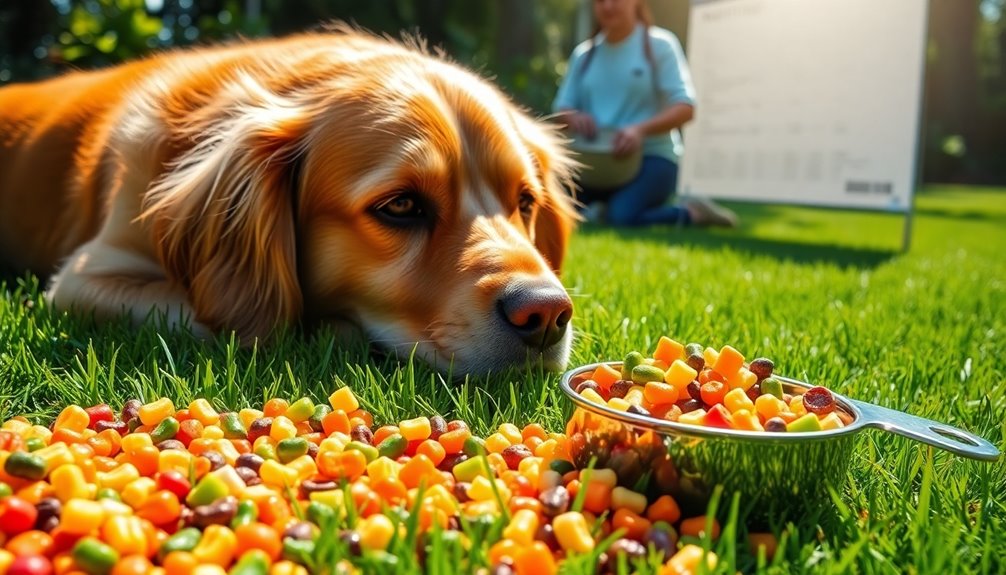
When it comes to understanding your dog's nutritional needs, it's essential to recognize that these requirements change throughout their life stages. Puppies, for instance, need higher protein to support their rapid growth, while adult dogs typically require maintenance diets to prevent them from becoming overweight or obese.
As your dog ages, their dietary needs shift again; senior dogs often benefit from diets rich in antioxidants and joint supplements.
For middle-aged dogs, increasing fiber without adding extra calories can help manage their weight effectively. Additionally, keep an eye on their coat health—if it looks dull, it might indicate a deficiency in essential fatty acids like Omega-3 and Omega-6, which are important for skin and coat vitality.
Don't overlook the importance of monitoring for food sensitivities, as long-term feeding of the same diet can lead to allergic reactions, resulting in itching or gastrointestinal issues.
Regular veterinary consultations are necessary to assess and adjust your dog's dietary needs based on health evaluations, ensuring they receive ideal nutrition throughout their life.
Adapting their diet as they age can greatly enhance their quality of life.
Signs Your Dog Needs a Diet Change
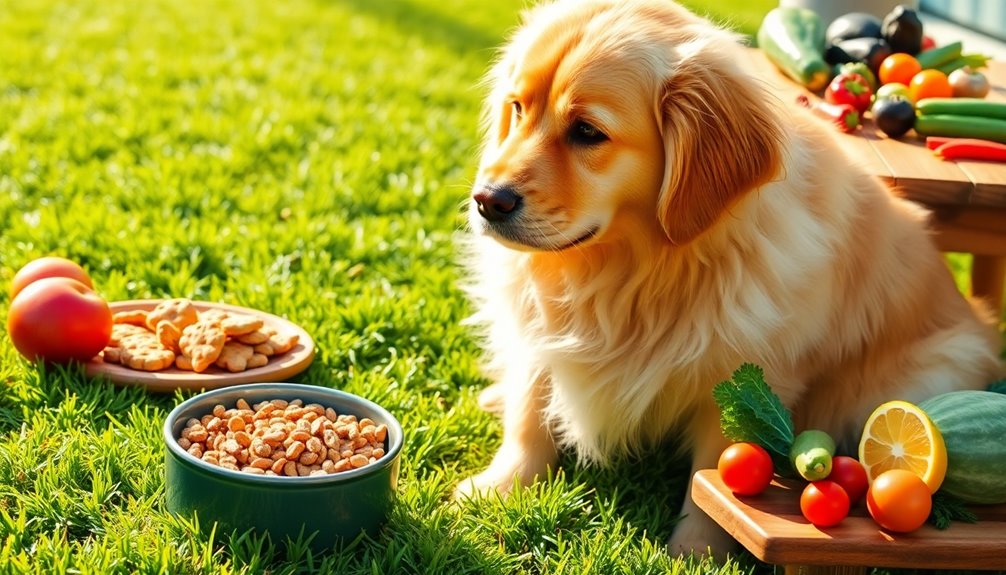
Recognizing the signs that your dog needs a diet change can greatly improve their overall health and well-being. If you notice a dull, flaky coat, it might indicate a lack of essential fatty acids in their diet, signaling a need for a nutritional overhaul.
Sudden lethargy or weakness can also be a red flag, suggesting dietary deficiencies that require veterinary consultation.
Keep an eye out for symptoms of food allergies, such as persistent itching or skin irritation. These may indicate that it's time to contemplate a hypoallergenic or limited ingredient diet.
Visible signs of obesity, like an inability to feel your dog's ribs or a sagging stomach, clearly point to the necessity of a revised feeding plan to promote a healthier weight.
Additionally, gastrointestinal disturbances, such as ongoing diarrhea or excessive flatulence, can suggest food intolerance. If you notice these issues, it's wise to reassess your dog's dietary choices.
By being aware of these signs, you can make informed decisions about your dog's nutrition, ensuring they live a happier, healthier life.
Don't hesitate to seek professional guidance when making a diet change.
Age and Weight Considerations
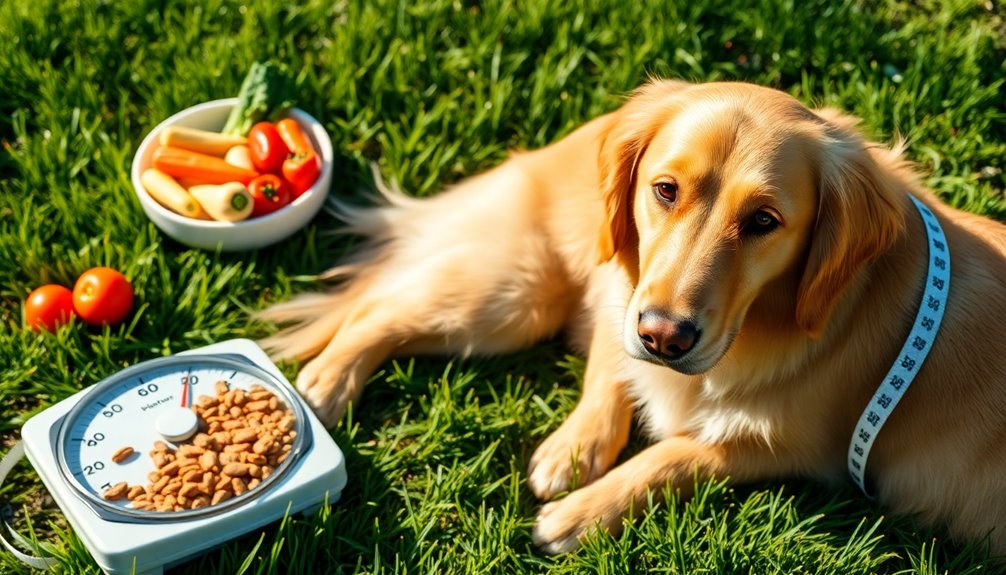
As your dog ages and their weight fluctuates, it's important to adjust their diet accordingly. Puppies need diets rich in protein and calories to support their growth, while adult dogs should shift to maintenance food to avoid obesity.
If your dog is a senior, typically around 5-7 years, consider changing to a lower-calorie diet that's high in fiber and includes joint-supporting nutrients like glucosamine.
Weight management is significant, especially since over 54% of dogs in the U.S. are overweight, putting them at risk for serious health issues like joint diseases and metabolic disorders.
Regular veterinary assessments at each life stage are essential to confirm your dog's nutritional needs are met and to adjust their diet as needed.
Maintaining your dog's ideal body weight can extend their lifespan by up to two years compared to overweight companions.
It's not just about feeding them; it's about providing the right diet for their age and weight. So, make it a priority to monitor their weight and consult your vet to keep your furry friend healthy and happy throughout their life.
Identifying Food Sensitivities
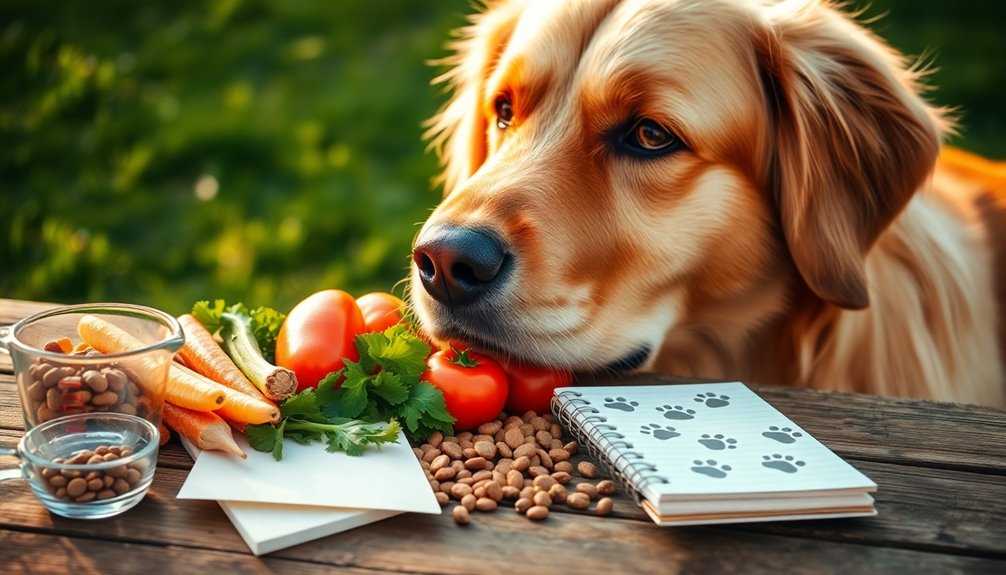
When your dog shows symptoms like itching, vomiting, or diarrhea, it might be time to rethink their diet.
Rotating their food can help prevent sensitivities from developing, while keeping a food diary can reveal potential allergens.
Always consult your veterinarian to rule out any underlying health issues before making changes.
Common Allergy Symptoms
Identifying common allergy symptoms in dogs is essential for pinpointing potential food sensitivities. If your dog is experiencing itching, licking of their paws, or skin irritation, these could be signs of food allergies.
Additionally, gastrointestinal disturbances such as vomiting and diarrhea can indicate that your dog's diet mightn't be suitable for them.
It's important to differentiate between food allergies and environmental triggers, like dust mites, which can exacerbate skin conditions. To help with this, consider keeping a detailed food diary. This can assist you in tracking any adverse reactions to different diets, making it easier to identify specific food sensitivities.
If you suspect food allergies, gradual reintroduction of foods is vital. Abrupt changes to your dog's diet can complicate the process and obscure the identification of allergens.
While blood tests can be performed, they're often less reliable than skin tests, which can better identify the specific allergens affecting your dog. Additionally, consult with your veterinarian about best dog food for allergies, as they can recommend specialized diets to help manage your dog's sensitivities.
Dietary Rotation Benefits
By rotating your dog's diet, you can considerably reduce the risk of developing food sensitivities and allergies. Properly managed dietary rotation introduces varied protein sources and nutrients, which helps prevent the development of food allergies. This approach not only enhances nutrient absorption but also promotes your dog's overall health.
Here are some key benefits of dietary rotation:
- Mitigates symptoms: Regular changes can reduce prolonged exposure to specific ingredients, helping to alleviate symptoms of food sensitivity like itching and gastrointestinal distress.
- Improves energy levels: Periodic dietary adjustments can boost your dog's energy and wellness, making playtime even more enjoyable.
- Enhances coat health: Different foods provide unique vitamins and minerals that contribute to a shiny, healthy coat.
To effectively identify specific allergens or sensitivities, consider keeping a food diary while gradually reintroducing new foods. This practice can help you pinpoint which ingredients may cause issues. Additionally, incorporating raw food into your dog's diet can further improve their overall health and vitality.
Veterinary Consultation Importance
A thorough veterinary consultation is important for pinpointing food sensitivities in your dog. When your pup shows symptoms like itching, vomiting, or diarrhea, you need a professional assessment to rule out other medical issues that may mimic these signs. A veterinarian can accurately identify food sensitivities and recommend the necessary dietary adjustments to improve your dog's health.
Long-term feeding of the same food can lead to allergic reactions, making it essential to get veterinary guidance. Your vet can suggest a managed diet rotation to prevent sensitivities and guarantee your dog gets the right nutrients. They might recommend specialized hypoallergenic or limited ingredient diets tailored to your dog's unique needs.
Ongoing support from your veterinarian is critical for monitoring your dog's response to dietary changes. As you make adjustments, your vet can help you track progress and make further modifications as needed.
This collaboration guarantees that your dog remains healthy and comfortable while addressing food sensitivities effectively. Don't hesitate to reach out to your veterinarian; their expertise is key to helping your furry friend thrive on a properly managed diet.
Health Risks of Obesity

If your dog is overweight, you need to be aware of the serious health risks that come with it.
Conditions like joint disease, heart problems, and even a shorter lifespan can affect your furry friend.
Recognizing the signs of obesity is essential for ensuring your dog's well-being and longevity.
Health Implications of Obesity
Obesity poses serious health risks for dogs, affecting their quality of life and longevity. Approximately 54% of dogs in the U.S. are classified as overweight, which creates a domino effect of health concerns. When your dog struggles with obesity, they're more prone to serious conditions that can diminish their vitality and lifespan.
Here are some key health implications to take into account:
- Joint Disease: Obesity greatly increases the risk of osteoarthritis and other joint-related issues.
- Heart Problems: Overweight dogs face a higher risk of heart disease and hypertension, which can lead to severe complications.
- Increased Cancer Risk: Obesity can elevate the likelihood of certain cancers, making weight management essential for your dog's overall health.
Effective weight management strategies, including dietary adjustments and increased exercise, are important. By addressing obesity proactively, you can help prevent chronic conditions that require ongoing veterinary care.
Signs of Overweight Dogs
Recognizing the signs of an overweight dog is essential for maintaining their health and well-being. Over 54% of dogs in the U.S. are classified as overweight, which can lead to serious health issues. One of the first things to look for is the absence of an identifiable waist. If you can't easily feel your dog's ribs under the skin or notice a sagging stomach, these are clear indicators of excess body fat.
Being overweight puts your dog at risk for various health issues, including joint disease and metabolic disorders. In fact, about 25% of overweight dogs may develop osteoarthritis, which can severely impact their mobility.
Additionally, obesity can lead to chronic inflammation, heart disease, and even certain cancers, potentially shortening their lifespan by up to two years.
To combat these risks, regular monitoring and adjustments to your dog's feeding practices are vital. Weight management isn't just about aesthetics; it's about ensuring your furry friend enjoys a long, healthy life.
Keep an eye out for these signs, and act promptly if you suspect your dog is overweight. Your dog's health depends on it!
Effective Feeding Practices
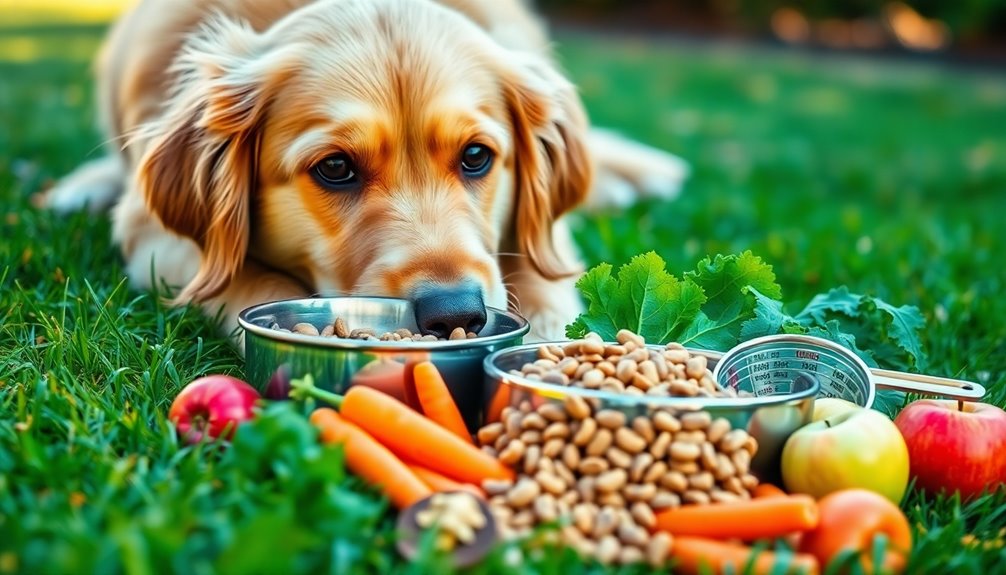
Effective feeding practices are essential for maintaining your dog's health and managing their weight. To achieve this, you'll need to focus on your dog's calorie intake and establish good feeding habits. Here are some tips to help you get started:
- Measure Portions: Always measure your dog's food to prevent overfeeding. This helps you maintain control over their calorie intake.
- Limit Treats: Treats should never exceed 10% of your dog's total daily calories. Opt for healthy alternatives like baby carrots or cucumber slices to keep their weight in check.
- Frequent Meals: Consider feeding smaller, more frequent meals to aid digestion and support weight management.
Additionally, while it's fine to share occasional healthy table scraps, remember that not all human foods are safe for dogs. Moderation is key!
Regularly consulting with your veterinarian will also help you create personalized feeding guidelines that align with your dog's specific caloric needs and activity level.
Benefits of Diet Rotation

Rotating your dog's diet can greatly enhance their overall health and well-being. By introducing a variety of foods, you can prevent the development of food allergies and sensitivities that often arise from long-term feeding of the same diet. This diet rotation supports ideal nutrient absorption, giving your dog a broader range of vitamins and minerals crucial for their health.
Additionally, changing your dog's food regularly helps maintain a healthy weight. By adjusting caloric intake and nutrient composition based on their changing needs, you can guarantee your dog gets the nutrition they require without overfeeding. This balance can lead to improved energy levels and liveliness.
Moreover, varied diets can considerably improve your dog's coat health. Foods rich in essential fatty acids and antioxidants promote a shiny coat and overall well-being.
To achieve these benefits, remember to implement diet rotation gradually, ideally over 7-10 days, to avoid gastrointestinal distress.
Collaborating With Your Veterinarian

Collaborating with your veterinarian is essential for creating a diet plan that fits your dog's unique needs.
Regular check-ups let you monitor how well the new diet is working and make adjustments as your dog ages.
Your vet can also suggest tailored dietary recommendations based on health assessments, ensuring your dog stays healthy and happy.
Importance of Regular Check-ups
Regular veterinary check-ups are vital for your dog's health and well-being, especially when it comes to their diet.
These visits help guarantee that your furry friend's nutritional needs are met at every stage of life. Regular assessments allow your veterinarian to monitor your dog's weight and identify any potential health issues, such as obesity or allergies, that may require dietary adjustments.
Here are a few reasons why regular check-ups are important:
- Personalized Recommendations: Your vet can tailor dietary suggestions based on health assessments.
- Weight Monitoring: Routine evaluations enable timely interventions to prevent obesity-related health issues, which affect 54% of U.S. dogs.
- Proactive Health: Consistent visits facilitate early detection of dietary-related issues, improving overall well-being. Additionally, regular consultations can help ensure that your dog's diet is aligned with current nutritional guidelines to support optimal health.
Tailored Dietary Recommendations
Creating a personalized diet plan for your dog is essential for their long-term health and happiness. By collaborating with your veterinarian, you can develop a tailored dietary plan that addresses your dog's unique nutritional needs based on factors like age, health status, and lifestyle.
Regular check-ups allow your vet to identify any underlying health issues that may require dietary changes, such as obesity, allergies, or gastrointestinal problems.
Your veterinarian will recommend appropriate food types—like high-protein diets for growing puppies or lower-calorie options for overweight adults—ensuring that they comply with AAFCO standards.
Consulting your veterinarian also helps you understand potential food sensitivities and the benefits of diet rotation, which can prevent allergies and enhance nutrient absorption.
Additionally, your vet can assist in monitoring the effects of dietary changes through regular assessments and weigh-ins, ensuring your dog achieves and maintains their ideal weight.
Remember, a tailored dietary plan is more than just food; it's about fostering your dog's overall well-being, so don't hesitate to reach out to your veterinarian for expert guidance.
Your commitment to their health will make a significant difference.
Implementing a Weight Loss Plan

When you're ready to tackle your dog's weight loss plan, the first step is to consult with a veterinarian to determine your pet's ideal body weight. This is essential since overweight dogs may live up to two years less than their ideal-weight counterparts.
Next, adjust your dog's caloric intake based on their ideal weight, not their current weight. Aim for a weight loss of 1-4% of their body weight every two weeks. Limit treats to no more than 10% of their total daily calories, and opt for healthier alternatives like:
- Baby carrots
- Cucumber slices
- Green beans
In addition to dietary changes, an exercise routine is important. Regular physical activity will help your dog shed those extra pounds, but remember that managing their diet is the primary factor for significant weight loss.
Establish a consistent routine that includes daily walks, playtime, or even agility training to keep them engaged and active.
Monitoring Dietary Changes and Progress
How can you ascertain your dog is adapting well to their new diet? Start by closely monitoring dietary changes and watching for any signs of distress, like gastrointestinal upset.
Keep an eye on their stool consistency, as this can give you clues about their adaptation. It's essential to track your dog's weight regularly. If weight loss is necessary, aim for a gradual decrease of 1-4% every two weeks.
Maintaining a detailed food diary can also be beneficial. Document any reactions to the new diet to help identify potential food sensitivities or allergens.
Pay attention to changes in your dog's coat condition, energy levels, and overall health, as these factors can indicate how well they're adjusting to the new food.
If your dog experiences persistent diarrhea, vomiting, or other adverse symptoms, don't hesitate to consult with your veterinarian. These issues might require immediate attention and adjustments to their diet.
Frequently Asked Questions
How Do I Know if I Need to Change My Dog's Diet?
To know if you need to change your dog's diet, watch for signs like a dull coat, lethargy, or sudden energy changes.
If your dog experiences gastrointestinal issues, such as flatulence or loose stools, it might be time for a food evaluation.
Regular vet check-ups can help assess weight and overall health, and if your dog develops skin problems or allergies, consider a hypoallergenic or limited ingredient diet to address potential allergens.
How Long Should a Dog Be on Weight Management Food?
Your dog should stay on weight management food until they reach their ideal body weight, which you can determine with your vet.
Regular weigh-ins are key, aiming for a weight loss of 1-4% every two weeks.
Often, you'll need to keep them on this diet for several months, or even for life, to maintain their weight loss.
When shifting off, do it gradually and monitor their caloric intake closely.
What Is the Healthiest Diet for Dogs?
Think of your dog's diet as a well-tuned engine; it needs the right fuel to run smoothly.
To keep your pup healthy, focus on high-quality proteins, healthy fats, and a mix of carbohydrates and fibers. Tailor their diet to their life stage—puppies need more calories, while seniors benefit from lighter meals with joint support.
Avoid fillers and rotate protein sources to prevent allergies and guarantee a balanced, nutritious diet.
Your dog will thrive!
At What Age Should You Switch Your Dog to Senior Food?
You should consider switching your dog to senior food around the age of 7, but it really depends on their breed and health.
Senior diets often contain fewer calories and more fiber to meet the needs of aging dogs.
It's a good idea to consult your veterinarian for personalized advice, as they can evaluate your dog's health and help you determine the right time for the changeover.
Don't forget those regular check-ups!
Conclusion
So, after all this talk about your dog's diet, you might think it's just a matter of tossing in some kibble and calling it a day. But who knew that Fido's health could hinge on such seemingly mundane choices? If you're still feeding him whatever's on sale, you might be more of a dog's worst enemy than a loving owner. Embrace the irony: a little effort now could mean fewer vet visits—and that's the real treat for both of you!










